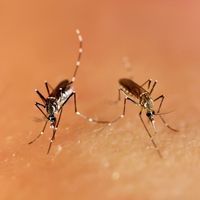mosquito-borne disease

Insects Pass Antiviral Immunity to Offspring
Abby Olena, PhD | Dec 17, 2020 | 4 min read
In both Drosophila and mosquitoes, protection lasts for generations following a single maternal exposure to positive-sense single-stranded RNA viruses.

Mosquitos in Asia and the Americas More Susceptible to Zika Virus
Abby Olena, PhD | Nov 19, 2020 | 4 min read
A study explains how Zika was present among mosquitoes in Africa for decades without causing the harm to human health seen outside the continent in recent years.

Bacteria-Laced Mosquitoes Limit Spread of Dengue
Amanda Heidt | Aug 28, 2020 | 4 min read
Cases of dengue were greatly reduced in areas of a city where Wolbachia-infected mosquitos were released, according to preliminary data from a field study.

How the COVID-19 Pandemic Has Affected Field Research
Ashley Yeager | Aug 20, 2020 | 6 min read
Unable to travel to international or remote sites, some researchers are losing critical data.

Humans Inoculated with Genetically Modified Malaria Parasites
Ruth Williams | May 20, 2020 | 4 min read
Engineered Plasmodium parasites form the basis of two experimental malaria vaccines that showed safety and encouraging immune responses in clinical trials.

The Scientist Speaks Podcast - Episode 2
Niki Spahich, PhD | Feb 26, 2020 | 1 min read
The Buzz About Genetically Modified Mosquitoes

Dengue Cases Drop After Bacteria-Infected Mosquitoes Released
Emily Makowski | Nov 22, 2019 | 2 min read
Aedes aegypti infected with Wolbachia—which inhibit transmission of the dengue virus from insect to human—were deployed in Indonesia, Vietnam, Brazil, and Australia.

Combination Strategy Nearly Eliminates Invasive Mosquitoes in Field
Abby Olena, PhD | Jul 17, 2019 | 3 min read
Researchers use two techniques—Wolbachia infection and irradiation—to suppress reproduction in populations of Asian tiger mosquitoes at two study sites in China.

Allele Shows Pyrethroid Resistance’s Spread in African Mosquitos
Carolyn Wilke | Mar 22, 2019 | 4 min read
Researchers can now track the expansion of a resistance mechanism that allows the malaria vector Anopholes funestus to detoxify a key insecticide used on bed nets.

Infographic: Fighting Malaria Drug Resistance
Natalie Slivinski | Mar 1, 2019 | 2 min read
The parasite that causes malaria has evolved to evade many of the drugs that researchers have developed to fight the tropical disease.

Are We Headed for a New Era of Malaria Drug Resistance?
Natalie Slivinski | Mar 1, 2019 | 10+ min read
Plasmodium falciparum has shown an ability to evade everything we throw at it, most recently artemisinin-based combination therapies, today’s front-line treatment.

Study: Gene Drive Wipes Out Lab Mosquitoes
Ashley Yeager | Sep 24, 2018 | 2 min read
No females were produced after eight generations, causing the population to collapse.

Zika Likes it Warmer than Dengue: Study
Anna Azvolinsky | Aug 15, 2018 | 4 min read
Climate change may open up new habitats suitable for the virus’s spread.

World First: Human Case of Keystone Virus Identified
Kerry Grens | Jun 22, 2018 | 1 min read
A Florida teenager is the first person with a confirmed infection by the mosquito-borne virus.

Image of the Day: Skeeter Eater
The Scientist and The Scientist Staff | Feb 22, 2018 | 1 min read
Geckos could help control mosquito-borne diseases, but their effectiveness depends on the environment.

Wolbachia-Laced Mosquitoes to Be Released for Population Control
Katarina Zimmer | Nov 7, 2017 | 1 min read
The US government has approved the deployment of the lab-raised insects to eliminate the Zika- and dengue-transmitting Asian tiger mosquito.

Gene Drive Limitations
Jef Akst | Oct 9, 2017 | 2 min read
In lab populations of genetically engineered mosquitoes, mutations arose that blocked the gene drive’s spread and restored female fertility.

Pregnant Women Absent from Zika Vaccine Trials
Aggie Mika | Aug 14, 2017 | 6 min read
Some vaccine developers are taking steps to include them, in line with bioethicists' urging, but it will likely take years before any expectant mothers are enrolled.

Suspected Yellow Fever Outbreak in Brazil
Tracy Vence | Jan 18, 2017 | 1 min read
According to the World Health Organization, relatively low vaccination coverage in the state of Minas Gerais “could favor the rapid spread of the disease.”

Using Gene Drives to Limit the Spread of Malaria
Tony Nolan and Andrea Crisanti | Jan 1, 2017 | 10 min read
Introducing genetic changes into mosquito populations could be key to effective malaria control.
